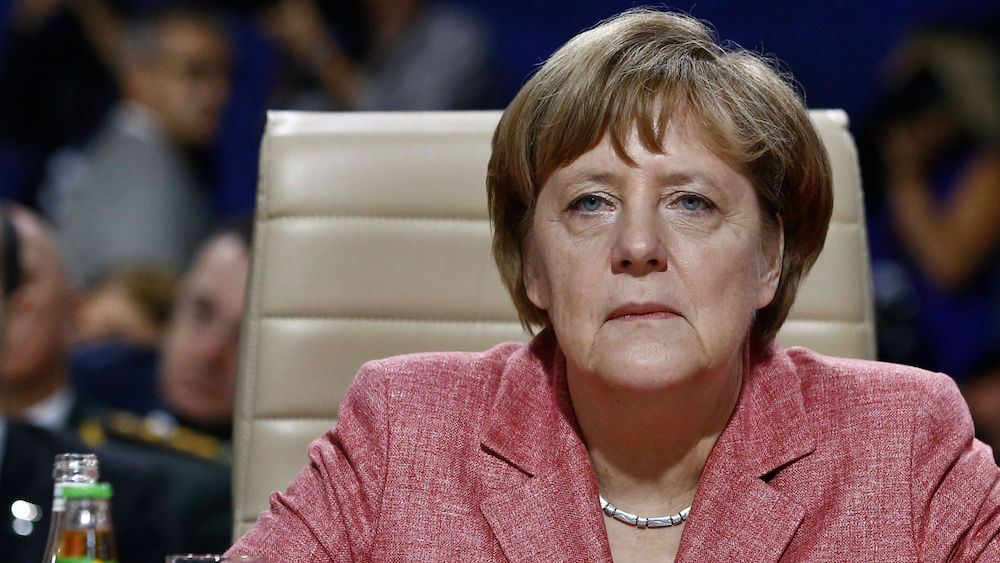A European Union without Britain will bolster Berlin’s already strong position in the short term. But longer-term, Germany faces a political paradox: though technically stronger in a UK-less EU, it will also be more isolated. It will take all the German chancellor’s finesse to navigate the continent to less choppy waters.
Angela Merkel likes simple living and balanced budgets. The German chancellor’s only luxuries are €300 handbags from Longchamps – a veritable bargain in the world of high-end accessories. Which is a shame, because there’s no end of cheap money on offer to Berlin since Britain voted to leave the EU.
Anxious investors want a safe haven, and have been happy to pay Berlin to take money off their hands. Negative interest rates of 0.05 percent on German long-term sovereign debt mean that the more Berlin borrows, the more it earns. But Berlin still will not be borrowing – it just achieved its long-desired balanced budget.
The negative interest rate on German debt is just one odd after-effect of the Brexit vote. As in the euro crisis, Germany seems to be a calm port in a political storm. While neighbors in France and the Netherlands are battling jubilant anti-EU populists, Germany’s euroskeptic Alternative für Deutschland (AfD) is facing a meltdown thanks to a vicious leadership feud.
Merkel’s other political critics, meanwhile, have had no luck getting their post-Brexit attacks to stick. Some say her austerity politics pushed British voters to the EU exit. No, says the chancellor: Britain isn’t in the euro, and was untouched by the euro rescue measures. Others German critics have condemned Merkel’s line in the refugee crisis for fanning the flames of xenophobia in the Brexit debate. No, argues the chancellor: Britain’s ongoing migration debate is not about Syrian refugees, but Bulgarian welfare recipients and the free movement of people in Europe – and that’s an ongoing EU debate, not her fault.
Though it’s still early days, what’s already clear is that the Brexit crisis has boosted even further Germany’s prominence on the continent. Which capital did Theresa May call first from 10 Downing Street? Berlin. Where did Irish prime minister Enda Kenny fly to this week to flag Ireland’s own Brexit concerns? Berlin.
All this attention should be flattering, but not if you’re German. The euro crisis sparked lots of dark talk about German domination of Europe, and I’ve yet to meet a senior official here who relishes the idea of lording it over their neighbors.
Given their terrible history, today’s Germans like being part of a European consensus. In recent decades, the most comfortable political format was the Franco-German alliance. In EU money matters, Britain and the Netherlands were like-minded allies. But London is on the way out, and anti-EU populism is on the rise – paralyzing Paris, above all, as a partner.
Political Paradox
So while things in Germany are calm for now, people are fearful of a political paradox in the future: they are afraid that Germany, though technically stronger in an EU without Britain, will actually be weaker due to its isolation.
To pre-empt that situation, and to recover lost voter enthusiasm for the European project, Berlin is anxious to deliver real results that improve people’s lives. If measures to cut youth jobless rates or plans to boost common security take too long to achieve support in Brussels, Berlin is happy to push forward with other capitals in an inter-governmental fashion.
In the weeks and months of Brexit talks ahead, meanwhile, Merkel will be a key figure in trying to keep Britain as close to the bloc as possible – without rewarding its decision to leave. And this will be the run-up to her own re-election bid in September 2017.
On security policy, Berlin will also want to keep Britain close. Germany has stepped up its foreign and security policy engagement in recent years, whether in Ukraine or in the Syrian stand-off, but its “leading from the center” philosophy betrays Germany’s inherent caution – and, in some quarters, its utter lack of enthusiasm – regarding its new obligations. With Britain out of the EU but still in NATO, it’s no surprise that Germany is anxious to keep defense ties to London alive by boosting European co-operation with the transatlantic defense alliance.
Ordinary Germans are not sure about where all this is going. Nor are Germany’s neighbors.
And Germany’s chancellor? A year before her third term ends, Angela Merkel is as unchallenged as ever at home – with 59 percent support – but challenged like never before around Europe. One EU camp sees Merkel’s leadership as key to holding the bloc together. Another camp, though, resents a so-called Merkel diktat, and their resentment could yet pull the continent apart.
For the long-serving German leader, Brexit promises to be the latest, greatest, and riskiest round of a balancing act that has framed her first decade in power.







